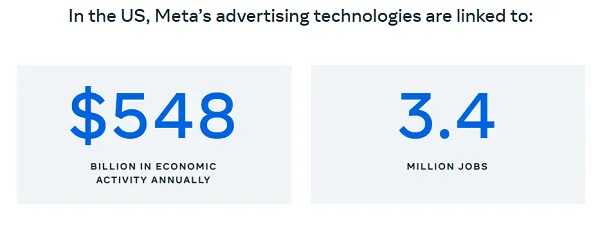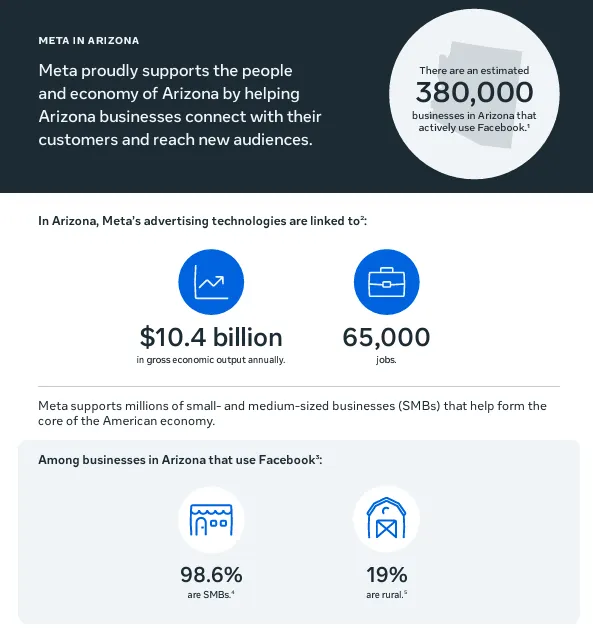Meta Shares US Economic Impact Data as It Seeks To Boost Political Influence
The report includes state-by-state breakdowns of Meta's economic impact.

As it continues to build on its political influence, with a view to maximizing its future opportunities, Meta has published a new report which provides an overview of the company’s broader economic impact, and highlights the benefits that it’s provided to the American economy.
The report, which replicates a similar review that Meta published in 2022, aims to showcase the positive impact of Zuckerberg’s social media behemoth, and includes state-by-state breakdowns to further showcase its specific economic effects.
Which is exactly the kind of data that Meta can use to sway individual U.S. senators in arguments relating to support for suture projects, and overall, the aim seems pretty overt in this respect.
As Meta explains:
“Today, we released findings from a new study we conducted that delves into the impact of our personalized ad technologies on the U.S. economy and finds that they were linked to nearly $550 billion in economic activity and 3.4 million jobs in 2024.”

Yeah, that’s a lot of economic benefit. Enough to potentially give Meta a level of political immunity in some respects.
“Not only is this a positive impact on the U.S. economy as a whole, but behind the numbers are real Americans building businesses, hiring and getting hired, earning their livelihoods and supporting their communities. These findings represent a 32.5% increase in economic activity and a 10% increase in jobs compared to an identical study conducted in 2022. Currently, more than 35 million businesses in the United States use Facebook and Instagram to grow their operations every month, with more than 2 million American businesses advertising monthly across our apps to reach customers.”
Of course, this is no surprise. Meta is now a massive business, and its impact is huge, which the U.S. government is well aware of.
But Meta is also pushing for more political support, in various ways:
The FTC is currently in the midst of a court trial in which it’s seeking to force Meta to divest both Instagram and WhatsApp due to what it’s alleging have been anti-competitive practices on Meta’s part. Various U.S. states are pushing for restrictions on social media use among younger teens. AI regulation could derail Meta’s AI development plans, and cost it billions in future business. Meta’s also facing constant scrutiny overseas, particularly in Europe, which have cost it billions in fines, and which it’s hoping the White House will help it push back on in future.These are just some of the regulatory battles that Meta’s facing, which is where these economic breakdowns, including state-specific overviews, could help it win more support.

Meta also highlights the benefits of its ad business, which has also come under attack in Europe of late:
“Millions of American businesses – from mom-and-pop shops to big global brands – use our personalized advertising tools to reach customers and grow. In recent years, we’ve been improving the AI systems that power these tools to make them simpler and more efficient to use, and to ensure businesses get the best possible return for their ad dollars. Importantly, when the ads people see are better aligned to their interests, they have a better experience, too.”
Again, it’s a fairly blatant political pitch, intended to sway senators in their future support of the company, by showing how Meta contributes to their region specifically, and what they could lose if they don’t enable Meta’s growth plans.
Will that work?
I mean, TikTok has taken a similar approach, and that hasn’t panned out as it intended. But then again, the concerns around TikTok are wholly different, so it’s not in the same category as Meta either way.
I would think that Meta’s state-based notes could indeed give it more weight in political arguments, with more pointed, pre-prepared data points to raise in future debates.
For the general public, I’m sure there’s some level of interest in this info as well, but the main aim is to push these numbers under the noses of U.S. senators as they consider future Meta-related votes.
You can check out Meta’s full U.S. economic impact report here.

 Koichiko
Koichiko 






























